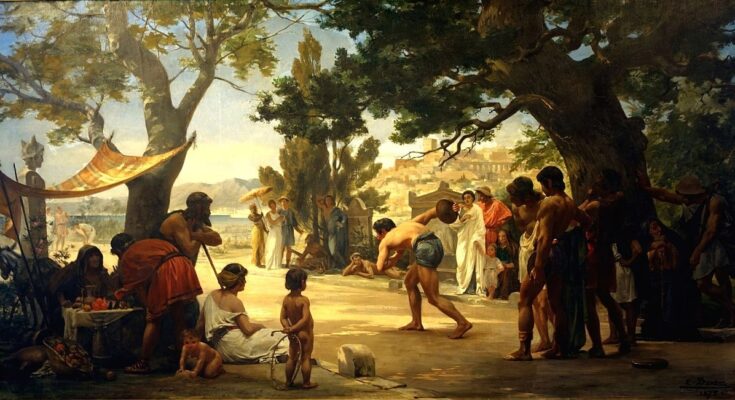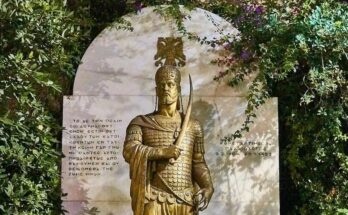The enduring legacy of the Olympic Games is among the principal achievements of the ancient Greeks. Since its rebirth in 1896, the modern Olympics has become the most important event for contemporary athletes and sports fans alike.
About 1,500 years passed between the last ever ancient Greek Olympic Games and their modern revival. Due to a combination of factors, including religious change and political upheaval, the Olympics were eventually abandoned in antiquity.
Although historians generally accept that the ancient Olympics came to an end in the fourth or fifth century AD, the exact date of the last ever Games remains uncertain. This is due to a lack of concrete evidence and certain complications such as a change of location for the Games.
Importance and evolution of the ancient Olympic Games
To the ancient Greeks, the Olympics held both athletic and religious importance and were a part of the wider Panhellenic Games. They took place at the Panhellenic religious sanctuary in Olympia as a tribute to Zeus, with the Greeks attributing their beginnings to mythological events.
The first recorded Olympic Games are typically dated to 776 BC. These games were held every four years, a period known as an Olympiad, which became a significant measure of time in historical chronologies.
The ancient Greeks held the Games in high esteem and the Olympic truce (Greek: ekecheiría) was declared, allowing athletes and religious pilgrims to travel safely from their cities to Olympia. Winners were awarded olive leaf wreaths or crowns as prizes and were celebrated as heroes by their peers.
The Olympics endured in Greece under Roman rule. Like many elements of Greek culture, the Romans took an interest in the Games. This was particularly true of philhellene emperors such as Hadrian, who patronized and invested in the Olympics.
The end of an era
The widely accepted date for the last celebration of the ancient Olympic Games is the year 393 AD, often attributed to an edict issued by Emperor Theodosius the Great, who ruled from 379 to 395 AD. However, this date has been challenged by various historians.
Howell and Howell, for example, examined sources including The Theodosian Code, a compilation of imperial decrees up to 438 AD, and found no specific decree abolishing the Games at Olympia issued by Theodosius. They argue that the evidence does not conclusively support the ending of the Games in 393 or 394 AD.
Similarly, historian Robinson highlights that the historian Cedrenus, who proposed the 393 AD date, based his writings on earlier sources without independent verification, casting further doubt on the exact timing.
Evidence supporting a later date for the end of the Olympic Games is substantial. During the reign of Theodosius II, who ruled from 408 to 450 AD, repeated edicts were issued against pagan practices, including those in 408 and 435 AD, which ordered the destruction of pagan temples and shrines.
This has led some historians to propose that the Games could have continued until around 405 or even 433 AD after which the shrine to Zeus, a central symbol of the Games, was likely no longer standing. These later decrees suggest a sustained effort to eliminate pagan rituals well into the fifth century, implying that the Games might have persisted beyond the traditionally accepted end date.
Further complicating the issue, Theodosius the Great himself did not appear entirely opposed to traditional activities near pagan temples. In 399 AD, he issued a decree that allowed festival assemblies and public amusements to continue, provided they did not involve pagan sacrifices or superstitions. This decree indicates that while the religious aspects of the Games may have been suppressed, the athletic competitions themselves might have been permitted to continue in some form.
Athletic festivals in general were not eradicated immediately following Theodosius the Great’s reign. Evidence suggests that such events continued into the sixth century, as noted in the Justinian Code of 528 AD, which still contained regulations exempting successful athletes from certain civil obligations. The persistence of these athletic competitions despite their pagan origins underscores the possibility that the Olympic Games did not abruptly cease in 393 AD but rather declined gradually.
The gradual decline could have been influenced by factors such as barbarian invasions, economic challenges, and changing cultural tastes, as suggested by historians like Robinson and Cameron. In conclusion, the exact date of the last ancient Olympic Games remains uncertain.
While the year 393 AD has gained general acceptance, primarily due to Cedrenus’ account, significant evidence suggests that the Olympics may have continued well into the fifth century. Until new evidence is discovered, the precise timing of the end of the ancient Olympic Games will likely remain a subject of scholarly debate.



